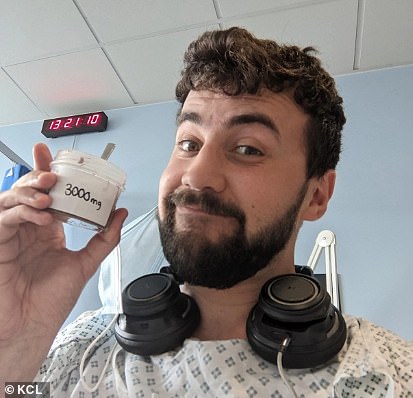A 28-year-old man who almost died from his severe peanut allergy now eats them every day after a ‘life changing’ trial.
Chris Brookes-Smith could never have an enjoyable experience when eating out or abroad as he was plagued with fear that he could die if even the smallest trace of peanut crept into his food.
Ten years ago he suffered his worst allergic reaction after ordering a curry from his local Indian restaurant.
He was rushed to hospital when after one bite he developed spots on his lips and began vomiting.
Soon afterwards his throat closed up, hives formed all over his body and his face became swollen. ‘I thought I was going to die,’ he told the BBC.
The hives were so panful it felt ‘like boiling water had been poured over me,’ he added.
But now the cybersecurity specialist eats them every day with his breakfast after he participated in a clinical trial that changed his life.
The study at Guy’s and St Thomas’ NHS Foundation Trust and King’s College London recruited 21 adults between 18 and 40 with a clinical diagnosis of the allergy to test if they could be desensitised, also known as oral immunotherapy.

Chris Brookes-Smith, 28, almost died from his severe peanut allergy now eats them every day after a ‘life changing’ cure

But now the cybersecurity specialist eats them every day with his breakfast after he participated in a clinical trial at Guy’s and St Thomas’ NHS Foundation Trust and King’s College London

Chris was given small amounts of peanut powder to eat at home mixed with yoghurt. Patients are started with the equivalent of 0.5 per cent to one per cent of a whole peanut
It works by consuming microscopic amounts of peanuts and gradually increasing the dosage to build up immunity.
Chris was given small amounts of peanut powder to eat at home mixed with yoghurt. Patients are started with the equivalent of 0.5 per cent to one per cent of a whole peanut.
His dosage increased gradually and once he could tolerate 50-100mg of peanut protein he was switched to eating whole peanuts, peanut butter or peanut products.
Once participants achieved a daily dose of 1g they remained on this for at least four weeks before undergoing another food challenge.
This involved being given increasing doses of either peanut or placebo on separate days to test their tolerance. Participants then continued daily dosing for at least three months.
By the end of the nine-month study, which was funded by the National Institute for Health and Care Research, 14 of the patients were able to eat the equivalent of five peanuts without reacting—including Mr Brookes-Smith.
Anxious about willingly ingesting peanuts, the 28-year-old said his heart was going ‘a million miles an hour’ during the study.
But a team of doctors and nurses were on standby, with drugs such as adrenaline at the ready in case of a reaction.

By the end of the nine-month study, which was funded by the National Institute for Health and Care Research, 14 of the patients were able to eat the equivalent of five peanuts without reacting—including Mr Brookes-Smith

Chief Investigator Professor Stephen Till said the trial provides preliminary evidence that adults can also be desensitised to peanut allergies, but that larger studies were needed to confirm findings
‘You’ve got 100 eyes on you, nothing is going to happen,’ he said.
After successfully completing the trial, he told the BBC: ‘I’m no longer afraid of dying.’
About one in every 200 adults in the UK—0.5 per cent—has a nut allergy. Life-threatening reactions called anaphylaxis occur when the immune system mistakenly overreacts, affecting a patient’s ability to breathe.
However building tolerance is known to help calm and prevent this extreme reaction.
The trial, published in the journal Allergy, shows adults with serious allergies can increase the amount of peanut they can tolerate by 100 times.
Participants for whom the strategy works should eat four peanuts every morning to keep the allergy at bay, as recommended by doctors.
Chief Investigator Professor Stephen Till, Professor of Allergy at King’s College London, said: ‘Constant fear of life-threatening reactions place a huge burden on people with peanut allergy.
‘The only way to manage a peanut allergy is strict avoidance and treatment of allergic reactions, including with adrenaline.
‘Although peanut immunotherapy is known to be effective in children, this trial provides preliminary evidence that adults can also be desensitised and that this improves quality of life.’

The trial, published in the journal Allergy , shows adults with serious allergies can increase the amount of peanut they can tolerate by 100 times
But he said larger studies were needed to confirm findings.
Lead author, Hannah Hunter a specialist Allergy Dietitian from Guy’s and St Thomas’ NHS Foundation Trust said: ‘Living with peanut allergy is a huge burden due to the need for constant vigilance and the risk of accidental exposures.
‘Everyday situations such as eating in restaurants and social events are anxiety provoking and our patients tell us that the condition also affects travel choices and career options.
‘We found that quality of life significantly improved after oral immunotherapy and fear of food also decreased. Many participants who completed the trial told us that the treatment had been life-changing and they were no longer living in fear.’
Public Health Minister, Ashley Dalton said: ‘This groundbreaking research offers hope to thousands living with peanut allergies. For too long, people have navigated daily life in fear of accidental exposure that could be life-threatening.
‘I’m proud the UK is leading this vital work through NIHR funding. These results show how we’re transforming lives through science, potentially changing care standards for adults with peanut allergies worldwide.’







